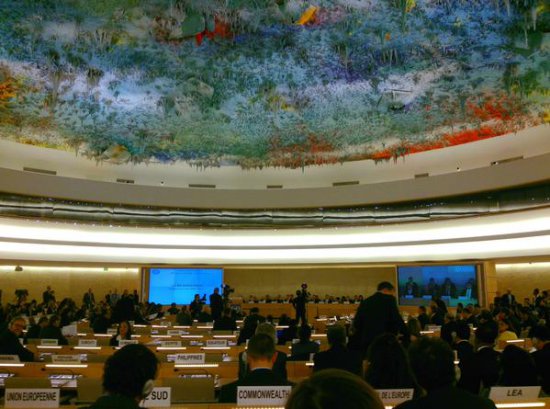Source: FIDH
In an irony of sorts, as its 28th session concludes today, the United Nations Human Rights Council (HRC) has demonstrated its relevance as the main international human rights body only with regard to issues and countries – mass surveillance, the relationship between freedoms of expression and religion and, to some extent, Syria – in the face of which the international community has seemingly been in a stalemate. Conversely, the Council has failed to fulfill its mandate to robustly respond to human rights crises, from Azerbaijan to South Sudan and Egypt, or did so in an unbalanced and one-sided way, as was the case for Iraq.
The Council has seized the opportunity to show its relevance by addressing attacks against, and challenges to, individual human rights. Firstly, as made clear by the NSA PRISM case, mass surveillance is a major human rights issue globally. By creating a mandate of UN Special Rapporteur on the right to privacy, the Council addressed the lack of specific monitoring of, and reporting on, this right at the international level. The new mandate will cover all issues related to the right to privacy, including mass surveillance.
Secondly, as the aftermath of the attacks in Paris, Copenhagen and Tunis showed, the right to freedom of expression is threatened by those who want to restrict it on the basis of “respect for religion” or “religious symbols”. In this context, by adopting two consensual resolutions on the matter, the Council reaffirmed the existing international standards and prevented a reopening of the deleterious debate on “defamation of religion” that had torn it a few years ago. Such efforts will have to be pursued, to further monitor states, including those holding HRC membership which invoke religion as a means to crack down on dissent or to justify human rights violations and abuses.
Despite the political and military stalemate in Syria, by adopting a resolution calling for accountability for atrocities committed by government and armed opposition forces, which mentions the International Criminal Court (ICC), the HRC has reminded the international community of the centrality of the human rights dimension to the conflict – and to any peace prospect. “Whereas in New York, the Security Council is paralyzed by the double Russian-Chinese veto, the voice of the international community expresses itself in Geneva, through the Human Rights Council, where no country has the power to block a resolution,”said FIDH President Karim Lahidji. “The Council should however do more on Syria, starting with a clear call for a referral of the situation to the ICC and for the release of all peaceful activists detained by government and armed opposition groups,” he added.
By extending the mandates of the UN Special Rapporteurs on Iran and Burma, the HRC has also succeeded in fulfilling its responsibility to recall that these countries have not improved their abysmal human rights records and that international attention on human rights should not be diverted by the nuclear negotiations and the narrative of “Burma’s opening”, respectively.
However, by any standard, the Council has failed to fulfill its mandate with regard to the human rights crises in Azerbaijan, Bahrain, Egypt, Iraq and South Sudan, among others. On South Sudan, where war crimes and crimes against humanity have been committed with complete impunity, the HRC has remained paralyzed in the face of the need for justice and accountability. After and despite the failure of regional African initiatives seeking to bring the crisis to an end, the Council has failed to respond to calls for the creation of a Special Rapporteur mandated to monitor and publicly report on the country. “The Human Rights Council cannot fail the people of South Sudan any longer,” said Paul Nsapu, FIDH Secretary-General. “Apathy is not an option,” he added.
“The HRC as a whole has once again remained silent on Azerbaijan, Bahrain and Egypt, failing to respond to grave and widespread human rights violations and to the persecution of independent civil society in these three countries,” said Tolekan Ismailova, FIDH Vice-President.
Finally, the resolution that the Council adopted on Iraq [1] is weak, short and completely unbalanced, as it focuses on atrocities committed by Daesh and fails to unequivocally call on the government to put an end to crimes committed by its security forces and associated militias. Victims of atrocities, whoever commits them, deserve an equal treatment, and the Council should not repeat its one-sided approach to human rights crises, as in the case of Afghanistan or Iraq.
Background:
The Human Rights Council, a subsidiary organ of the General Assembly, is the main United Nations body in charge of human rights promotion and protection. It meets in three regular sessions each year, in Geneva. Its 28th regular session took place over four weeks, from 2-27 March 2015, during which the Council adopted 37 texts, including 34 resolutions (both country-specific and thematic) and three presidential statements. Its 29th regular session will take place from 15 June-3 July 2015.
At the Council’s 28th session, FIDH organized four side events (on Iran, Burma, South Sudan, and the relationship between freedom of expression and freedom of religion or belief) and two briefings (on freedom of religion in Pakistan, and Belarus). It also co-sponsored 14 side events, including on human rights defenders, business and human rights, Azerbaijan, Bahrain, the Gulf countries, the European Union and Palestine.
In plenary meetings, it delivered 10 oral statements and joined 6 oral statements delivered by other non-governmental organizations. Its Vice-President (also President of the Human Rights Center “Viasna”), Ales Bialiatski, addressed the Council during the “General Segment” immediately following the “High-Level Segment” dedicated to Heads of states and governments and to Ministers.
FIDH’s activities, as well as its analysis of initiatives, trends and developments, were featured on Storify.


